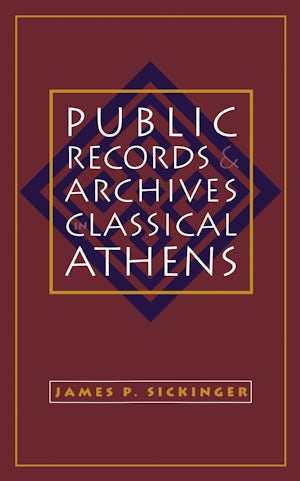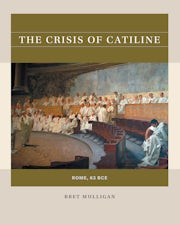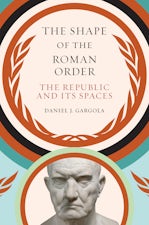Public Records and Archives in Classical Athens
By James P. Sickinger
288 pp., 6.125 x 9.25, notes, bibl., index
-
Paperback ISBN: 978-0-8078-5851-6
Published: February 2007 -
E-book PDF ISBN: 979-8-8908-6804-6
Published: February 2018 -
E-book EPUB ISBN: 978-0-8078-6116-5
Published: February 2018
Studies in the History of Greece and Rome
Buy this Book
- Paperback $45.00
- E-Book $29.99
Athenian public records are most familiar from the survival of inscribed stelai, slabs of marble on which were published decrees, treaties, financial accounts, and other state documents. Working largely from evidence supplied by such inscriptions, Sickinger demonstrates that their texts actually represented only a small part of Athenian record keeping. More numerous and more widely used, he says, were archival texts written on wooden tablets or papyri that were made, and often kept for extended periods of time, by Athenian officials.
Beginning with the legislation of Drakon in the seventh century B.C., Sickinger traces the growing use of written records by the Athenian state over the next three centuries, concluding with an examination of the Metroon, the state archive of Athens, during the fourth century. Challenging assumptions about ancient Athenian literacy, democracy, and society, Sickinger argues that the practical use and preservation of laws, decrees, and other state documents were hallmarks of Athenian public life from the earliest times.
About the Author
James Sickinger is assistant professor of classics at Florida State University in Tallahassee.
For more information about James P. Sickinger, visit
the
Author
Page.
Reviews
"This important study offers a major challenge to prevailing assumptions about ancient bureaucracy and literacy. . . . An illuminating and much needed analysis. . . . The insights it offers contribute to many current discussions of Athenian society and politics. Although primarily for scholars, the study is accessible to serious students."--Religious Studies Review
"An excellent work of scholarship on a very timely subject written from a completely original point of view. The author succeeds strikingly in introducing into the ongoing and fairly one-sided debate about classical Athens as a literate or an oral culture a great deal of ancient evidence which has remained almost completely overlooked by his predecessors. Moreover, he subjects all of the more familiar and oft-discussed data to a more searching and rigorous analysis than they have hitherto received."--Ronald S. Stroud, American School of Classical Studies




